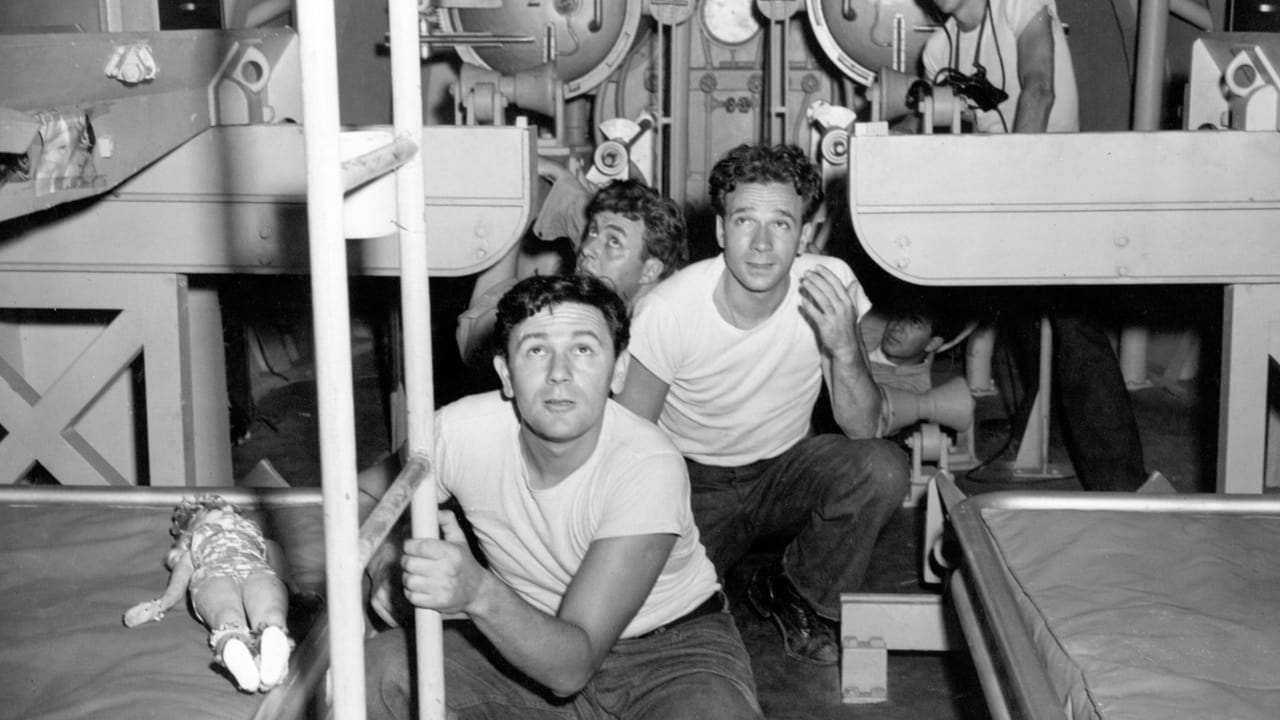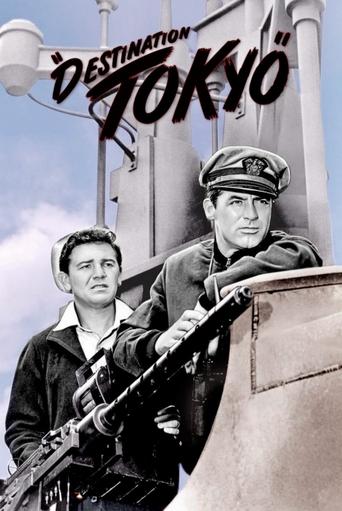

Heretofore screenwriter Delmer Daves directed his first film, and assisted Albert Maltz with the screenplay of this Steve Fisher story about a submarine crew charged with infiltrating Tokyo bay in order to provide valuable information to the first Allied bombing mission of that city.There's an interesting reference to this real mission in a movie about that James Doolittle-led bombing mission, Thirty Seconds Over Tokyo (1944), which was made by a different studio (MGM). Fisher's Original Story was Oscar nominated. Unusual casting and the human aspects of its personnel mark this above average (not P.C.) World War II (Warner Bros.) film.Cary Grant plays the decorated Captain of the sub, John Garfield plays its heroic gunner, Alan Hale its sentimental cook, Dane Clark a crewman with an ax to grind, and Robert Hutton its newest member "The Kid". William Prince plays the sub's "medical" staff, who's called upon to perform a miraculous operation when Hutton's character comes down with an appendicitis (based on a true story!).John Ridgely plays a Naval Officer who was raised in Japan, that's needed for the mission, and is picked up en-route. John Forsythe (who with Hutton was making his credited film debut) plays the radio operator who, along with Garfield and Ridgely, goes ashore in Japan under cover of darkness to fulfill the task at hand.
... View MoreWhen people praise this film for being realistic, they must be thinking of how it portrays the look of the insides of a submarine, the living conditions, the military procedures, and so on. They can't be talking about the characters or dialogue. Movies made during the war have to keep the spirits of the viewers up, so the effects on the scripts are deadly. The worst part of these movies is always the interplay between the characters, so good- humoured and cheery in every situation. The "boys" (and they do act like boys) are always light-hearted and playful with each other, like puppies in a box. Even their lusts seem childlike and innocent, consisting of a few jokes about a pin-up girl. Occasionally a character will be portrayed a little differently, fearful or bitter, but we know it will work out well, and it's really only for effect, a little spice added to the dish, and a hint that "Gee, you see how realistic this movie is (wink, wink)?" The commanders don't really worry much about death -- under fire, with the possibility of death facing them at any second, their faces register the kind of concern they'd have over a flat tire or while waiting for a daughter staying out late after her prom. It's what passes for bravery in these movies.Now in the case of "Destination Tokyo" can we really talk about realism when the submarine is usually an obvious model, when the captain sends the sub down to 150 feet and we can see the sunlight reflecting off the surface of the water a couple of feet over the model?Enjoy the movie for what it is, but let's get rid of the pretence that these are realistic to any significant degree. Just compare them for a second with "Das Boat" and what they leave out will become apparent.
... View MoreThis engrossing film takes place on a submarine bound for Japan to do a lot of damage. It primarily deals with the personnel on board. Led by Cary Grant, a tough, but real family man, this film goes on to explain various situations, including an emergency appendectomy done by a pharmacist on board the ship.John Garfield, as Wolfie, steals the show. He always talks of his adventures with women. In one scene, he talks about this with the music of Cole Porter's "Night and Day" as a backdrop. Ironically, Cary Grant is not in the scene. Two years later Cary was in a major biographical-picture with that title about the great Porter.Garfield and his guys do their work on land quickly to deliver valuable information that will aid in the bombing. That bombing as well as the bombing that the sub is subjected to is very realistically done.Grant talks of something that we can relate to today. He speaks of young Japanese children being taught at a young age to hate. It's so many years later and we hear the same thing about young Palestinians. War comes from hatred.
... View MoreSuave submarine skipper Cary Grant (as Cassidy) leads a Christian crew from San Francisco to Tokyo Bay, to fight the Godless Japanese. A flag-waver, "Destination Tokyo" sailed into theaters while World War II was being fought. Debuting director Delmer Daves and his cast manage to deliver some engaging performances, despite a stereotyped script, and some occasionally toyish production values. Star Grant is enjoyable, albeit not entirely successful, in an atypical war hero role.Soldiering John Garfield (as Wolf) and Dane Clark (as Tin Can) head up a likable crew. Veteran fellow traveler Alan Hale (as Cookie) goes through the motions, which is enough. Mr. Clark and John Forsythe (as Sparks) make good early career impressions. John Ridgely (as Raymond), Warner Anderson (as Andy), and Tom Tully (as Mike) are also featured. The uncredited cast is noteworthy, including Whit Bissell (as Yo Yo) and Carlyle Blackwell Jr.; the latter's father, Carlyle Blackwell (Sr.), was one of Hollywood's first genuine "superstar" actors.The most amusing "dramatic" interplay culminates with inexperienced William Prince (as Pills) deciding to operate on impossibly doe-eyed Robert Hutton (as Tommy)'s ruptured appendix. Ouch!***** Destination Tokyo (12/31/43) Delmer Daves ~ Cary Grant, John Garfield, Dane Clark
... View More